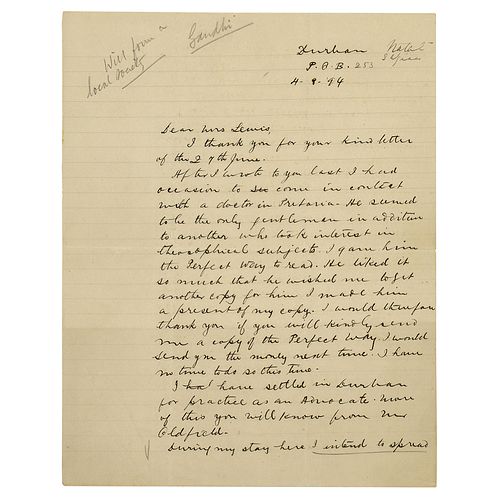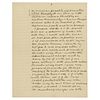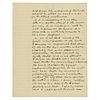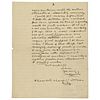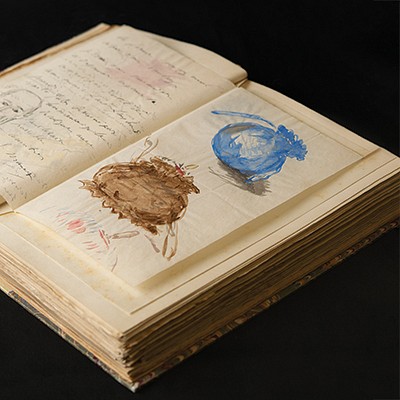Mohandas Gandhi Autograph Letter Signed (1894) on Theosophy
Two ways to bid:
- Leave a max absentee bid and the platform will bid on your behalf up to your maximum bid during the live auction.
- Bid live during the auction and your bids will be submitted real-time to the auctioneer.
Bid Increments
| Price | Bid Increment |
|---|---|
| $0 | $5 |
| $50 | $10 |
| $200 | $25 |
| $500 | $50 |
About Auction
Jun 14, 2023
RR Auction's June Fine Autographs and Artifacts sale boasts over 900 lots, highlighted by a special animation section of 200+ pieces of original production drawings, animation cels, and concept paintings from Disney classics like Snow White, Cinderella, and Alice in Wonderland. = RR Auction support@rrauction.com
- Lot Description
ALS signed “M. K. Gandhi,” four pages, 8.5 x 10.75, August 4, 1894. Handwritten letter to Mrs. A. M. Lewis of the Esoteric Christian Union, written during his second year in South Africa, regarding his efforts to promote interest in theosophy. In part: "I had occasion to come in contact with a doctor in Pretoria. He seemed to be the only gentleman in addition to another who took interest in theosophical subjects. I gave him the Perfect Way to read. He liked it so much that he wished me to get another copy for him‰Û_During my stay here I intend to spread as much as possible information about theosophy (to me there is little difference between Theosophy and Esoteric Christianity). I have therefore sent out letters to the President of the Vegetarian Society and Mrs. [Annie] Besant. I propose that the E.C.U. should send me a selection of books to be sold here. I would sell the books at cost price plus the postage and 5% commission to be kept by me. As to the price however I should be left free to use my discretion. I would send up the sale proceeds of the books every three months. The advertisement charges will be borne by me. If at the end of one year nothing is sold I would return the books at my cost. I give my personal guarantee for the safe keeping of the books and the sale proceeds‰Û_If it is necessary to read this letter or a portion thereof to the Union you can do so. I hope you will be able to persuade the Union, or those in authority, to accede to the above proposal."
Gandhi continues to discuss a controversial work: "If you do not think much of the 'Souls,' what position is the book to occupy in respectful literature? If the author has written what is absolutely true from personal observation, the book cannot be lightly treated. If it is an attempt to delude the people into a belief in real truths by fascinating falsehoods the book deserves the highest condemnation possible. For we will not learn truth by means of falsehoods. Of course I write this without meaning the slightest disrespect for the author of whom I know nothing. She may be a lady of the highest probity and truth. I only repeat that to appreciate the Souls acquaintance with the author's character is absolutely necessary."
Finally, Gandhi dejectedly mentions a petition that Lewis had sent him: "I could get many signatures‰Û_But I am afraid the Natal signatures would be quite useless. Is it not a sad commentary on the morality of the age that a most important and yet most harmless and elevating monument should not receive good support? At times when I think of these things I thoroughly despair of fruits of works. A verse from the Bhagavad Gita saves me from utter despair and consequent inaction—a verse which enjoins freedom from attachment to fruits of works." In a brief handwritten postscript, signed with his initials ("M.K.G."), he adds: "Please note change of address." In fine condition.
Gandhi had settled in South Africa in 1893, taking on a one-year contract as an attorney for an Indian merchant there. It was while living in this racially charged environment that Gandhi began to develop his political ideology, which was informed by his interest in theosophy—an occultist stream of Western esotericism that drew its teachings from a variety of religious traditions. In this letter, he discusses the book The Perfect Way; Or, the Finding of Christ by Anna Kingsford and Edward Maitland, an influential early theosophical book.
Maitland was a member of the Theosophical Society and in November 1891 founded the Esoteric Christian Union. Gandhi became the Union's South Africa agent in 1894, as he so suggests here. Maitland and Gandhi opened a correspondence, and Mailtand introduced Gandhi to Tolstoy's The Kingdom of God Is Within You—a book which 'overwhelmed' Gandhi and led him toward nonviolence as a means to promote political change. While protesting in Johannesburg in 1906, Gandhi adopted his famous methodology of 'Satyagraha,' or nonviolent protest, which would become critical to his later fight for Indian independence.
Upon his return to India in 1915, Gandhi embarked on a decades-long crusade for Indian independence, demonstrating and urging nonviolence and civil disobedience as the most effective means of achieving this goal. His public acts of defiance resulted in repeated incarceration and brought him to international attention. In 1947—some 53 years after writing the present letter—he participated in the postwar negotiations that led to Indian independence; in the following year, he was assassinated by a Hindu fanatic. A lengthy, early, and important letter from Gandhi's formative years in South Africa. - Shipping Info
-
Bidder is liable for shipping and handling and providing accurate information as to shipping or delivery locations and arranging for such. RR Auction is unable to combine purchases from other auctions or affiliates into one package for shipping purposes. Lots won will be shipped in a commercially reasonable time after payment in good funds for the merchandise and the shipping fees are received or credit extended, except when third-party shipment occurs. Bidder agrees that service and handling charges related to shipping items which are not pre-paid may be charged to a credit card on file with RR Auction. Successful international Bidders shall provide written shipping instructions, including specified Customs declarations, to RR Auction for any lots to be delivered outside of the United States. NOTE: Declaration value shall be the item’(s) hammer price and RR Auction shall use the correct harmonized code for the lot. Domestic Bidders on lots designated for third-party shipment must designate the common carrier, accept risk of loss, and prepay shipping costs.
-
- Buyer's Premium



 EUR
EUR CAD
CAD AUD
AUD GBP
GBP MXN
MXN HKD
HKD CNY
CNY MYR
MYR SEK
SEK SGD
SGD CHF
CHF THB
THB